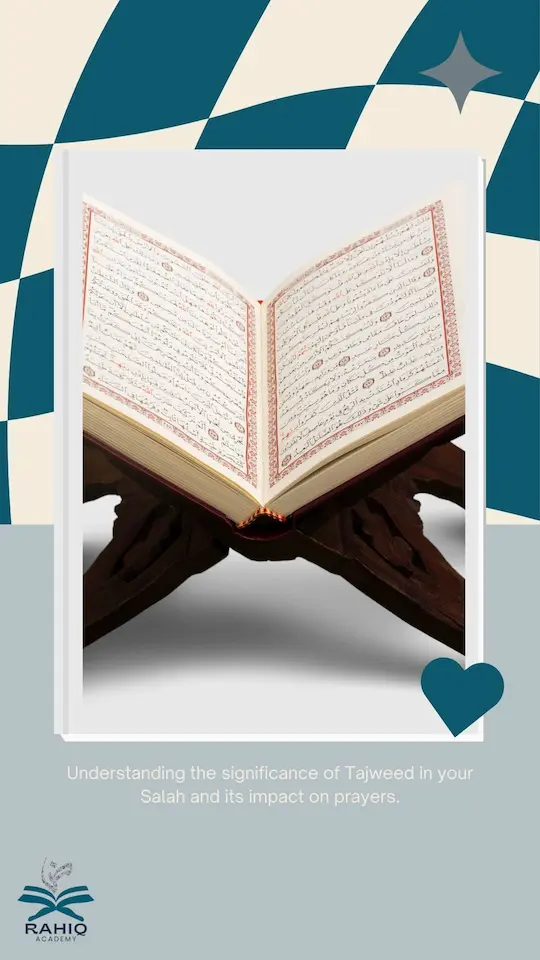Is tajweed mandatory in salah? You’re not alone if you’ve wondered this. A 2023 survey by Pew Research shows over 65% of Muslims feel unsure about Tajweed rules in daily prayer. But which mistakes actually affect your Salah? And which don’t? These 3 must-know truths clear up the confusion—without complicated words or long fatwas. Let’s break it down simply.
Is Tajweed mandatory in Salah? A Clear, Honest Answer Every Muslim Can Understand
Many Muslims ask, is tajweed mandatory in salah? The simple truth is this: only if your mistake changes the meaning. Otherwise, your prayer is valid. Here’s what you need to know.
1. What Is Tajweed?
- Tajweed is correctly pronouncing the Quran when reading it.
- It includes knowing how each letter is said (makhraj)
- Is repeated in the same manner as the Prophet ﷺ.
- It protects the meaning from being lost or changed
2. When Tajweed Becomes a Must?
- If you say a word in a way that changes its meaning, the prayer may be invalid
- This is most serious in Surah Al-Fatiha, which is recited in every rak’ah
- Saying the incorrect letter or a different word needs to be fixed.
- Scholars agree: basic tajweed is fard (required) in such cases
3. What If You’re Still Learning?
- If you’re new, struggling, or a non-Arabic speaker, don’t panic
- Small mistakes that don’t change the meaning are allowed
- Allah only expects effort from you—not perfection
- Focus on gradual improvement and sincerity
- The prayer remains valid as long as the meaning is safe
4. Why Tajweed Still Matters
- It helps prevent major mistakes
- Makes your prayers more focused, attention and serene.
- It deepens your connection with the Quran
- It follows the Prophet ﷺ’s example.
- You are rewarded for trying, even if you’re not perfect.
Finally, is tajweed mandatory in salah?
Yes—only if the mistake changes the meaning.
If the meaning is intact, your prayer is accepted.
Start with Al-Fatiha.
Read slowly.
Speak clearly.
Keep learning—step by step.
Your effort counts more than how perfect you sound.
9 Facts Explained: Is It Haram to Recite Without Tajweed?

Many Muslims wonder, is it haram to recite without Tajweed? The short answer: No, it’s not haram unless a mistake changes the meaning. Let’s break it down simply:
1. Tajweed Means Correct Pronunciation
- The rules of proper pronunciation when reciting the Quran are known as Tajweed.
- It follows the Prophet’s ﷺ example and protects the meaning of the Quran from mistakes.
- Correct Tajweed helps avoid mistakes that could alter the words’ meaning.
2. Tajweed is Recommended, Not Mandatory
- Tajweed is highly recommended but not mandatory for Salah (prayer).
- If the meaning of your prayer is still intact, it is valid.
- Minor mistakes in pronunciation are forgiven, especially for those still learning.
3. Major Mistakes Can Invalidate Salah
- If you make a mistake that changes the meaning, such as saying “أنعمتَ” (You) instead of “أنعمتُ” (I), your prayer becomes invalid.
- Surah Al-Fatiha is especially important. Mistakes in this Surah that alter its meaning must be corrected immediately for your prayer to count.
4. Minor Mistakes Are Forgiven
- Minor errors that don’t change the meaning of the recitation are forgiven.
- Small errors are not a sin for novices or non-Arabic speakers.
- Effort matters more than perfection. Your sincerity, not your fluency, is what Allah rewards.
5. Surah Al-Fatiha Needs Special Care
- Every rak’ah (unit of prayer) includes the recitation of Surah Al-Fatiha.
- Any mistake in Surah Al-Fatiha that changes the meaning will invalidate your prayer.
- Take your time to learn and pronounce it correctly.
6. When Does Tajweed Become Mandatory?
- Tajweed becomes mandatory only when your mispronunciation changes the meaning.
- For example, changing “صراط” (sirāt) to “سراط” (incorrect) changes the meaning and must be corrected immediately.
- If the meaning is preserved, even with mistakes, your prayer is valid.
- The key is clarity—focus on improving gradually.
7. Tajweed Helps You Improve Over Time
- Tajweed improves your recitation, helping you pronounce each letter.
- It brings focus and calm to your prayer, deepening your connection with the Quran.
- Daily practice will improve your Tajweed over time, but it doesn’t need to be perfect.
8. Effort Matters More Than Perfection
- Allah values your effort, not perfection.
- Struggling with Tajweed is okay as long as you’re trying your best.
- Fluency isn’t the goal—focus on clarity and sincerity in your recitation.
9. How to Improve Tajweed Step by Step
- Start with difficult letters like ص (Saad), ط (Taa), and ق (Qaaf).
- Practice Al-Fatiha daily to improve pronunciation.
- Use a teacher, Quran app, or voice recording tools to track your progress.
- Focus on clarity, not beauty or fluency.
- Stay consistent: Gradual progress is key. Don’t stress about perfection.
Final Advice
- Master Surah Al-Fatiha first—it’s recited in every rak’ah.
- Start small, focusing on the difficult letters.
- Pray with peace—Allah values your sincere efforts over perfect pronunciation.
Final Answer
Is Tajweed mandatory in Salah? No, reciting without Tajweed isn’t haram unless the mistake changes the meaning of the verse. Keep learning, stay consistent, and remember that Allah rewards your efforts—not your fluency. Focus on clarity, not perfection.
Summary of Recitation Errors (Lahn) in Tajweed
| Feature | Lahn Jali (Major Error) | Lahn Khafi (Minor Error) |
| Definition | Clear mistakes that change the structure or meaning of a word | Subtle mistakes that affect beauty but not meaning |
| Examples | – Switching letters (e.g., ص to س in “الصراط”) – Changing vowels (e.g., “أنعمتَ” to “أنعمتُ”) – Adding or omitting letters | – Weak Ghunnah or Ikhfa – Uneven Madd length – Slight letter vibration (e.g., repeating “Ra”) |
| Ruling | Forbidden (Haram) if done on purpose or with carelessness | Disliked (Makruh) but not sinful |
| Impact on Salah | This can make prayer invalid, especially if the meaning is changed | Does not affect the validity of prayer |
| Who Can Recognize It | Easily noticed by most people | Usually spotted only by Tajweed teachers |
Is It Obligatory to Learn Tajweed? Truths Must-Know
Many Muslims ask, is it obligatory to learn Tajweed? The answer depends on whether mistakes change the meaning. Here’s a clear, simple breakdown every Muslim can understand.
- Learning basic Tajweed is a duty for anyone reciting the Quran in prayer.
- This includes knowing how to pronounce each letter in its proper place.
- The goal is to avoid major mistakes that alter the meaning of a verse.
- Therefore, knowing the rules that protect the meaning is obligatory.
- Scholars agree: this level is known as Fard ‘Ayn—a personal duty for every Muslim.
- Advanced Tajweed (like perfecting Madd or Ghunnah) is not required for everyone.
- This deeper level is a communal duty (Fard Kifayah)—if some learn it, the rest are excused.
- Others say these fine details are recommended, not required.
- Major errors make you sinful; minor ones don’t.
- Minor mistakes (like soft Idghaam or Madd shortening) don’t change the meaning.
- Fluency is not required—but clarity is.
- If you can’t pronounce everything perfectly, your prayer is still valid—if the meaning is correct.
- Practice slowly and clearly. That’s what the Quran commands in Surah Al-Muzzammil.
- You don’t need perfect Tajweed—but you do need to avoid changing what Allah revealed.
Finally, yes—learning enough Tajweed to protect the meaning is obligatory. But full mastery of all detailed rules is not required. Focus on clarity. Keep improving. Allah sees your effort.
Summary
Is tajweed mandatory in salah? The answer matters—because your prayer does. Now that you know the truth, take your next step. Start improving your recitation with clear, slow practice. Rahiq Academy offers easy Quran memorization and tajweed courses to help you learn at your pace. Tajweed course .
Don’t wait. Focus on clarity. Keep learning. Let every word in your Salah carry its full meaning—just as it should.
FAQ’s
Q: What happens if I don’t use Tajweed in Salah?
A: If the mispronunciation alters the meaning, it can invalidate the prayer. Otherwise, your Salah remains valid.
Q: Does incorrect Tajweed invalidate Salah?
A: Only if the error changes the meaning of the words; minor mistakes don’t invalidate the prayer.
Q: Is learning Tajweed obligatory for all Muslims?
A: Learning basic Tajweed to ensure correct pronunciation is obligatory; advanced rules are recommended but not mandatory.
Q: Is Tajweed mandatory in Salah for women?
A: Yes, the rules apply equally to men and women regarding correct pronunciation in prayer.
Q: Is Tajweed mandatory in Salah according to scholars?
A: Scholars agree that correct pronunciation is essential; full Tajweed mastery is encouraged but not obligatory.
Q: Where can I learn Tajweed basics for Salah?
A: Try Rahiq Academy’s courses. Simple lessons, real teachers.
Q: Can non-Arabic speakers skip Tajweed?
A: No. But start small: master heavy letters (ص, ط, ق). Progress slowly.
Q: Is it a sin to recite Quran without Tajweed?
A: It’s not a sin unless major mistakes change the meaning. Allah values effort and sincerity over fluency or perfection.
Q: Is Tajweed more important for certain Surahs?
A: Yes, Surah Al-Fatiha requires special care as it is recited in every prayer unit. Mistakes here can affect Salah validity.
Q: Does Allah forgive Tajweed mistakes?
A: Minor mistakes are forgiven, especially for those learning. Allah appreciates sincerity and consistent effort in improving recitation.




